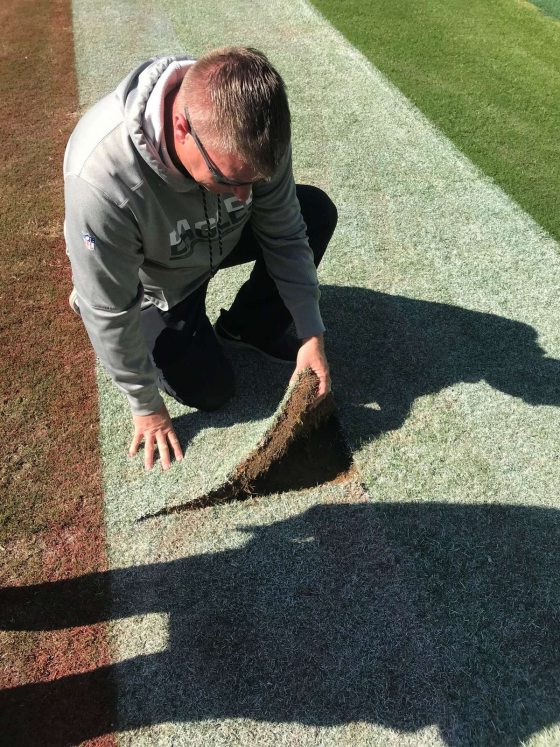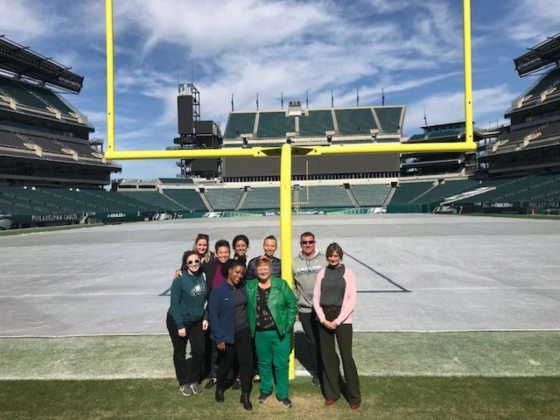Through visits to gardens and cultural destinations for salon-style discussions, the Longwood Fellows are given the opportunity to learn firsthand from experts in public horticulture and aligned industries. For our latest salon, we traveled to Lincoln Financial Field, home of the Philadelphia Eagles … and host of professional and college football games, blockbuster stadium concerts, monster truck rallies, and more. At “the Linc” we engaged with the Philadelphia Eagles’ Director of Grounds Tony Leonard and Chief Financial Officer Frank Gumienny on how they address the unique challenges of the stadium’s frequent and varied events, using creative and innovative practices to maintain this iconic football field and its turf.
Constructed in 2003, the Linc holds 69,000 stadium seats and hosts more than 20 major sporting events and concerts each year; events are covered by local and national news networks, giving millions more a close-up view into the venue. Unpredictable weather, changes in painted end zones, and quick resodding are just a few of the many challenges that Leonard and his team overcome to ensure seamless operations and a pristine playing field for game day. During our time at the Linc, we noted many similarities between the stadium and public gardens, notably in the approach to turf health and management. As gardens grow in popularity and rank among many cities’ most frequented tourist destinations, our turf spaces contend with increasingly heavy foot traffic and a busier schedule of special events than ever before.

Leonard walked us through the process of choosing optimal turfgrass species, as well as sourcing a producer, transportation, and installation for turf. He walked us across the field of the Linc to highlight different surfaces and their unique functions on game day, from the durable surfaces in the media and press area to the soft squares of turf for the football kicker’s practice, installed to emulate the nearby field. He explained that there is no “one size fits all” approach to turf maintenance among professional football leagues; similarly to public gardens, stadium conditions vary widely based on location, climate, sun exposure, and annual rainfall.
At Longwood, we tend 185 acres of turf throughout the Gardens, which can be just as challenging to maintain as our floral beauty. To make sure we’re keeping our turf pristine, we engage in a variety of turfgrass research projects to continually evaluate optimal turf cultivars for our Gardens, optimal mowing frequency; and best establishment technique for different species of grasses. Along the way, our findings help us more efficiently manage our turf, often reducing the amount of intervention needed to achieve the desired aesthetic and ecological goals. We also like to have a bit of fun with our turf, honoring the Fourth of July with patriotic designs achieved by bending the grass just-so, using a precise science and art.

When it comes to their commitment to operational excellence, the Philadelphia Eagles focus on their fans, eventgoers, and staff. “We are all Eagles,” shared Gumienny when describing his staff, from the players on the field to those in support and administrative roles. He described a culture of collective pride and ownership, in which many of their proudest customer service moments were led by frontline staff. Having served with the Eagles for more than 20 years, Gumienny shared wonderful key leadership insights with the Fellows … among them, that doing the right thing not only makes us feel good but serves as a strategy that makes sound business sense as well. Among their many guest service initiatives, the team provides “My First Eagles Game” certificates to their youngest fans and embraces a corporate social commitment to taking action for autism.

Public gardens benefit greatly from trading insights with our colleagues in aligned industries such as sporting and entertainment. We share a commitment to guest engagement, excellence in the maintenance of our horticultural resources, and creativity in our operations. Together, the grass is indeed greener!


